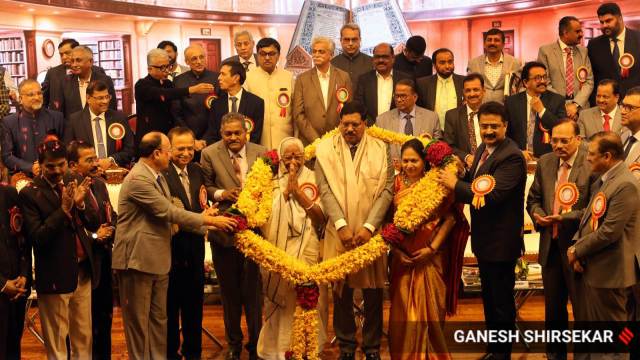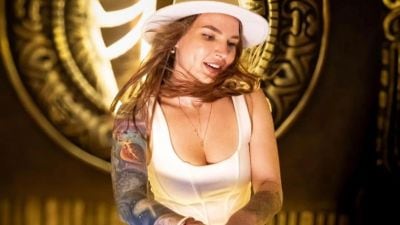On Maharashtra visit, CJI Gavai miffed over absence of top officials at event
Speaking at the event in Mumbai, organised by the Bar Council of Maharashtra and Goa, CJI Gavai said, “We say that there are three pillars of democracy, judiciary, legislature and executive, and that they are equal.
 CJI Bhushan Gavai's felicitation by Bar Council of Maharashtra and Goa in Mumbai on Sunday. (Express Photo by Ganesh Shirsekar)
CJI Bhushan Gavai's felicitation by Bar Council of Maharashtra and Goa in Mumbai on Sunday. (Express Photo by Ganesh Shirsekar)On his first visit to his home state of Maharashtra after taking over as Chief Justice of India on May 14, CJI B R Gavai expressed his disappointment at the absence of senior state officials at a felicitation event held in his honour Sunday, saying “every organ of the Constitution must…give its due respect to the other”.
Speaking at the event in Mumbai, organised by the Bar Council of Maharashtra and Goa, CJI Gavai said, “We say that there are three pillars of democracy, judiciary, legislature and executive, and that they are equal. Every organ of the Constitution must reciprocate and give its due respect to the other organs. A person from Maharashtra is coming to the state as Chief Justice of India for the first time. If Maharashtra’s Chief Secretary, the state’s Director General of Police or the Mumbai Commissioner of Police do not feel it necessary to come, it is for them to think about.”
Later, Chief Secretary Sujata Saunik, DGP Rashmi Shukla and Mumbai Commissioner of Police P Deven Bharti were present when CJI Gavai visited Chaitya Bhoomi to pay tribute to Dr B R Ambedkar.
Chief Secretary Saunik and Maharashtra Protocol Minister Jayakumar Rawal did not respond to requests for comment from The Indian Express on the absence of top officials at the felicitation event.
At the felicitation, CJI Gavai said he was not particular about protocol and preferred travelling to his hometown Amravati, and Nagpur, without pilot escort. “But it is a question of respect towards the judiciary by the other organs. If the head of an institution is coming to the state for the first time and he is from the state itself, whether their conduct was proper, is something they should think about,” he said.
CJI Gavai described his experience as a “small issue” but said he mentioned it so that people are made aware of it. “We, as judges, also travel to many parts of the country. We went to Nagaland, Manipur, Assam and recently to Amritsar. The DGP, Chief Secretary, Commissioner of Police were present. We went to Deoghar (in Jharkhand) four weeks ago, which is about 300-400 km away from the capital, Ranchi. The Chief Secretary and others were present at the airport there, too,” CJI Gavai said.
Addressing a full house of judges and lawyers from across the state, CJI Gavai said he was fortunate to have been appointed as Chief Justice of India in the 75th year of the Constitution.
He also pointed out that it has been over 50 years since the landmark Kesavananda Bharati case, which laid down that the basic structure of the Constitution cannot be changed. “The judgment laid down separation of powers and that the basic structure cannot be changed. Recently, I was asked about the debate, whether the judiciary is supreme or the executive. I said that it is neither the judiciary, nor the executive, nor the Parliament. But it is the Constitution of India which is supreme. All three wings of the Constitution are required to work as per the Constitution,” CJI Gavai said.
According to the CJI, the country has become strong because of the basic structure doctrine, and moved towards social and economic justice. “The judiciary and legislature came up with several laws due to which the concept of social and economic justice has continued,” he said.
CJI Gavai, who was accompanied at the event by his wife and mother, also spoke about his journey from a municipal school in Amravati and the influence of the principles of Dr Ambedkar and the values taught by his parents. He spoke of his law school days and his experience as a government pleader in Nagpur, recalling how a decision to vacate slums in the city within a week by a judge was successfully challenged.
“The same concept of the right to shelter came up before us during our decision of bulldozer justice in the Supreme Court recently. We upheld that the law cannot be breached to take away someone’s right to shelter only because they or their family member is accused of something,” he said.
CJI Gavai recalled that while he wanted to become an architect, he became a lawyer following his father’s wishes, who himself wanted to become a lawyer but could not.
He also spoke of working with Supreme Court judge Justice Abhay S Oka, having started together as lawyers in Mumbai 40 years ago. He said if he decides to write a book about his career, after his retirement in November, he would speak more about it. He said that both he and Justice Oka would not take up a post-retirement post.
Also present at the event were Supreme Court Justices Abhay S Oka, Surya Kant, Prasanna B Varale and Dipankar Datta, and Chief Justice of Bombay High Court Alok Aradhe.







